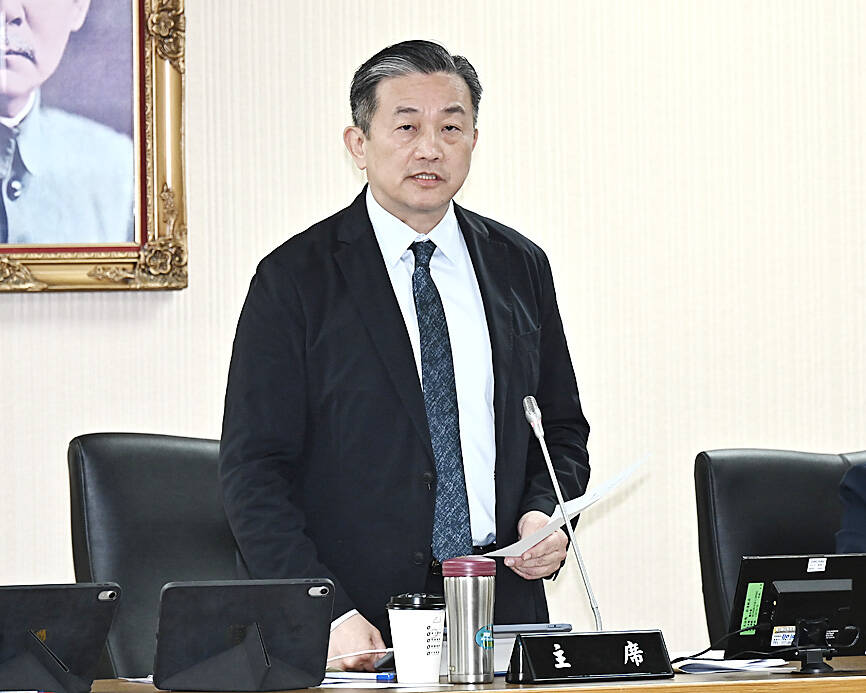The legislature’s Foreign Affairs and National Defense Committee yesterday passed motions condemning China’s “long-arm jurisdiction” over Taiwanese and refuting its misinterpretation of UN Resolution 2758.
The motion, put forth by Democratic Progressive Party (DPP) legislators, said that actions by China’s provincial governments, which offered cash bounties for information leading to the arrest of alleged psychological operations officers in Taiwan, amounted to provocation and a serious violation of Taiwan’s sovereignty.
China “has no jurisdiction” over the people of Taiwan, the motion said, adding that Taiwan would never allow Beijing’s attempts at “long-arm jurisdiction.”

Photo: Tu Chien-jung, Taipei Times
The motion was initiated by DPP Legislator Wang Ting- yu (王定宇), convener of the committee, and endorsed by three other DPP lawmakers.
The motion was passed unanimously by the six committee members who attended the session, while seven members from the Chinese Nationalist Party (KMT) and Taiwan People’s Party did not attend.
The motions stemmed from a notice issued on Oct. 11 by the public security bureau of Xiamen, publicizing the names, photographs and identification card numbers of 18 people it alleged to be “core members” of a “psychological warfare unit” within the Taiwanese military.
In the public notice, the bureau offered a cash reward of 10,000 yuan (US$1,407) to anyone who could provide information that would lead to the arrest of the 18 Taiwanese wanted for “separatist activities.”
China on June 5 also offered similar bounties for information that would help with the arrest of 20 Taiwanese it deemed to be “military hackers.”
The legislative committee on Wednesday last week also passed a motion condemning a criminal investigation being carried out by China into DPP Legislator Puma Shen (沈伯洋) on allegations of “secession-related” criminal activities deemed to be advocating Taiwanese independence.
Meanwhile, during the session yesterday, the committee also unanimously passed another motion initiated by Wang, condemning China’s distortion of UN Resolution 2758, adopted in 1971, which Beijing has used as the basis for its sovereignty claims over Taiwan.
The motion states that the UN Resolution 2758 only addresses the issue of China’s representation in the UN, and the full text does not mention Taiwan.
It said UN Resolution 2758 does not recognize Taiwan as part of the People’s Republic of China (PRC), nor does it authorize the PRC to represent Taiwan in the UN, adding that it is not equivalent to China’s claimed “one China” principle.
“The Republic of China (Taiwan) is a sovereign and independent country, it is not subordinate to the PRC,” the motion said. “Only Taiwan’s democratically elected government has the legitimacy to represent the Taiwanese people in international organizations such as the UN.”
Additional reporting by Huang Ching-hsuan

Conflict with Taiwan could leave China with “massive economic disruption, catastrophic military losses, significant social unrest, and devastating sanctions,” a US think tank said in a report released on Monday. The German Marshall Fund released a report titled If China Attacks Taiwan: The Consequences for China of “Minor Conflict” and “Major War” Scenarios. The report details the “massive” economic, military, social and international costs to China in the event of a minor conflict or major war with Taiwan, estimating that the Chinese People’s Liberation Army (PLA) could sustain losses of more than half of its active-duty ground forces, including 100,000 troops. Understanding Chinese

The Ministry of Foreign Affairs (MOFA) yesterday said it is closely monitoring developments in Venezuela, and would continue to cooperate with democratic allies and work together for regional and global security, stability, and prosperity. The remarks came after the US on Saturday launched a series of airstrikes in Venezuela and kidnapped Venezuelan President Nicolas Maduro, who was later flown to New York along with his wife. The pair face US charges related to drug trafficking and alleged cooperation with gangs designated as terrorist organizations. Maduro has denied the allegations. The ministry said that it is closely monitoring the political and economic situation

‘SLICING METHOD’: In the event of a blockade, the China Coast Guard would intercept Taiwanese ships while its navy would seek to deter foreign intervention China’s military drills around Taiwan this week signaled potential strategies to cut the nation off from energy supplies and foreign military assistance, a US think tank report said. The Chinese People’s Liberation Army (PLA) conducted what it called “Justice Mission 2025” exercises from Monday to Tuesday in five maritime zones and airspace around Taiwan, calling them a warning to “Taiwanese independence” forces. In a report released on Wednesday, the Institute for the Study of War said the exercises effectively simulated blocking shipping routes to major port cities, including Kaohsiung, Keelung and Hualien. Taiwan would be highly vulnerable under such a blockade, because it

UNRELENTING: China attempted cyberattacks on Taiwan’s critical infrastructure 2.63 million times per day last year, up from 1.23 million in 2023, the NSB said China’s cyberarmy has long engaged in cyberattacks against Taiwan’s critical infrastructure, employing diverse and evolving tactics, the National Security Bureau (NSB) said yesterday, adding that cyberattacks on critical energy infrastructure last year increased 10-fold compared with the previous year. The NSB yesterday released a report titled Analysis on China’s Cyber Threats to Taiwan’s Critical Infrastructure in 2025, outlining the number of cyberattacks, major tactics and hacker groups. Taiwan’s national intelligence community identified a large number of cybersecurity incidents last year, the bureau said in a statement. China’s cyberarmy last year launched an average of 2.63 million intrusion attempts per day targeting Taiwan’s critical